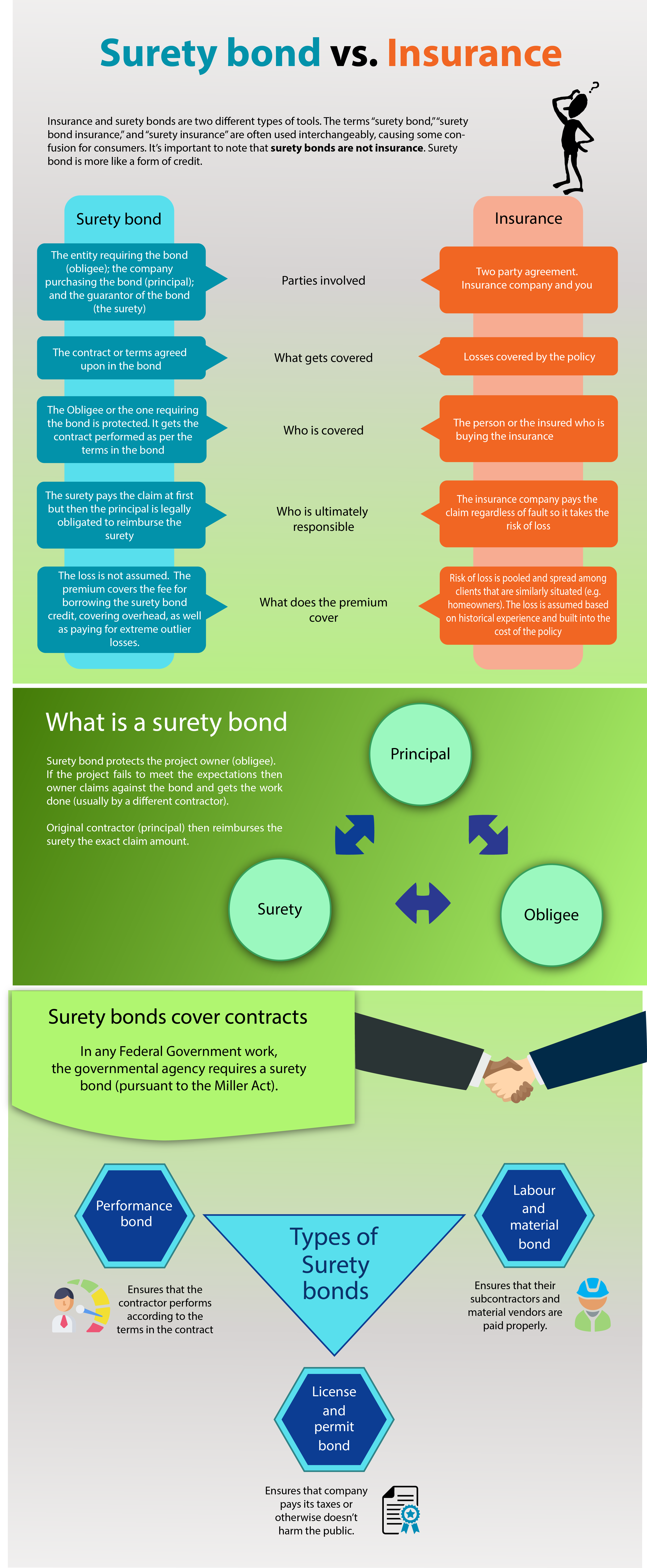Comparing Surety Bonds & Insurance
| Parties Involved | What gets Covered? | Who is Protected? | Who’s ultimately responsible? | |
| Insurance | The Insurance Company and you | Losses covered by the policy | The person buying the insurance | The insurance company takes the risk of loss |
| Surety Bonds | The entity requiring the bond (the obligee); the company needing the bond (the principal); and the supplying the bond (the surety) | The contract | The Obligee gets the contract performed per its terms | The surety pays the claim and then asks the principal to reimburse for those losses |
Navigating the world of surety bond can be both daunting and confusing, especially when faced with terms like "surety bond insurance" or "bond surety insurance". But worry not, this guide aims to clarify these terms and more, providing you with the knowledge to make informed decisions. It includes insights into such topics as premiums, reimbursement procedures, and the expenses associated with different policies.
What is Surety Bond Insurance?
Surety bond insurance, often simply termed as "surety insurance", is a three-party agreement, much like an indemnity agreement, where the insurer guarantees the principal will uphold the terms of the bond. Should the principal fail, the surety bond insurance company comes in, compensating the obligee in the form of an insurance claim. This effectively means that the risk of non-compliance is transferred from the obligee to the insurer, subject to the reimbursement agreed upon in the contract.
Business Surety Bond
A business surety bond is a type of surety bond that businesses may need to operate legally in certain states or industries. It's essential for companies to ensure they have required bonds in hand, as the expenses incurred by operating without them can result in penalties. A thorough investigation of the legal requirements, rights, and regulations of the states or industries in which they operate is therefore advisable for businesses.
The Role of Surety Bond Companies
A surety bond company, also referred to as a surety bond insurance company or a broker in some cases, is an entity that issues surety bonds to businesses or individuals. They assess risks, provide surety bond services, charge premiums, and sometimes even offer related insurance products, each featuring their unique logo.
Navigating the Market
There are multiple surety bond insurance companies on the market that understand the importance of an indemnity agreement and respect the rights of their clients. These are insurance companies that handle surety bonds as part of their insured products, often along with other types of insurance. Understanding the distinction between insurance company bonds and surety bonds insurance is crucial to ensure compliance with relevant regulations. The former refers to bonds that insurance companies might issue as part of their financial operations, while the latter refers to the insurance of the bond itself.
Comprehensive Surety Coverage
Bond and surety insurance cover a wide range of products. When considering surety bond insurance coverage, it's crucial to understand "what does surety bond insurance cover?" Typically, it ensures the completion of a contract or task. For those wanting extra peace of mind ensured by the protection of their rights, a surety bond certificate of insurance is concrete evidence of coverage and provides a guaranteed reimbursement in case of default.
Where to Purchase
There are numerous insurance companies, brokers and other interested parties that sell surety bonds. Whether you're looking for a state surety bond or a specialized product, there's likely an insurance company for surety bond needs that caters to your requirements. Some firms even go the extra mile, providing an insurance guarantee bond, ensuring another layer of protection, in compliance with any necessary regulations.Surety and bonds insurance often intertwine with other types of insurance, such as surety business insurance. This kind of insurance covers the business aspects related to bond issuance, adding an extra layer of security to all projects and transactions involved. In carrying out their duties, the surety company effectively links the business, the insurance, and the bond together. Also, while 'surity insurance' might sound like a term in this realm, it's likely a misspelling of 'surety insurance'. Understanding the basics of these terms is critical for all business owners, akin to obtaining a license on their character and knowledge in their field of work.
Additional Information
As businesses evolve, surety companies that offer surety bonds become increasingly more crucial. With increasing globalization, the importance of these bonds, which help companies navigate international contracts with confidence, is on the rise. To quote some industry insiders, these bonds can be significant game changers during global events, providing a level of security that can ease the burden of costs.
Future Trends
In sum, understanding the various facets and factors of surety bonds, from the insurance policy to the bonding process and coverage, is essential for businesses. It ensures not only compliance with municipality requirements but also provides a safety net against unforeseen business challenges. This safety net is secured by the premiums paid, and the power of each company's logo stands as a symbolic character of their commitment to their insured clients.
Surety bonds are an important risk mitigation tool, but it’s essential to know that insurance and surety bonds are two different types of tools. The terms “surety bond,” “surety bond insurance,” and “surety insurance” are often used interchangeably, causing some confusion for consumers. It’s important to note that surety bonds are not insurance, but are a distinct form of security provided by surety companies, with their own unique duties and responsibilities.
[sc_fs_multi_faq headline-0="h2" question-0="What’s the Difference between Insurance and Surety Bonds?" answer-0="Surety bonds are an important risk mitigation tool, but it’s essential to know that insurance and surety bonds are two different types of tools. The terms “surety bond,” “surety bond insurance,” and “surety insurance” are often used interchangeably, causing some confusion for consumers. It’s important to note that surety bonds are not insurance." image-0="" headline-1="h2" question-1="Is a surety bond an insurance policy?" answer-1="The quick answer to this is, no, a surety bond is not an insurance policy. Although it seems very similar to insurance a surety bond is really more like a form of credit (and it’s issued by surety bond companies, which are essentially a bunch of very conservative bankers). One of the key features is where the risk falls. On a surety bond, the risk is still on the principal and not the surety company." image-1="" headline-2="h2" question-2="What does the premium cover?" answer-2="In a typical insurance policy, the risk of loss is pooled and spread among all the clients that are similarly situated (such as homeowners), and the loss is assumed based on historical experience and built into the cost of the policy. In a surety bond situation, the loss is not assumed (as that would make the price astronomical). The premium covers the fee for borrowing the surety bond credit, covering overhead, as well as paying for extreme outlier losses. However, a loss is not assumed." image-2="" headline-3="h2" question-3="What do surety bonds cover?" answer-3="Surety bonds typically cover contracts. In Federal Government work, the governmental agency require a surety bond (pursuant to the Miller Act). There are two parts to these bonds: 1) a performance bond, which ensures that the contractor performs according to the terms in the contract (i.e., they actually build the building); and 2) labor and material bond, which ensures that they pay their subcontractors and material vendors. The second type of surety bond is one issued that ensures that the company pays its taxes or otherwise doesn’t harm the public. These are called License and Permit bonds." image-3="" count="4" html="true" css_class=""]
How does Bond insurance work?
A surety bond safeguards the project owner (called the Obligee). If the project is not accomplished according to the contract's terms, then the owner can make a claim against the bond and get the project finished (usually by another contractor). The surety will then look to be reimbursed for any loss by the original contractor.
There are many surety bonds that exist. Some of these bonds are in some serious niche industries, in some cases, customized to the needs of customers. However, a good surety bond (or security bond) can significantly reduce the amount of risk to your company. These risk mitigators, along with specific types of insurance, can considerably bolster your overall financial well being.
See the article below for some insightful advice on the difference between a surety bond and E&O Insurance.
https://www.allbusiness.com/how-protected-is-your-business-bonds-eo-insurance-105239-1.html
How Protected Is Your Business? Learn How to Safeguard It With Bonds and E&O Insurance
When I first kick-started my freelance career, I thought it was going to be a straightforward journey (didn’t we all?). Once I got into the thick of things I noticed that every query I received an answer to only sparked ten more questions in my mind. Does this process sound familiar?
This is a commonplace phenomenon for anyone diving into business for the first time.One of the most confusing acts, for me in the beginning, was understanding what it meant to be “bonded and insured”–or at least the difference between being “bonded” and being “insured.” I knew of both, thanks to my duty in my business career, but did not fully understand each until later on in my freelance career.
Admittedly, I had both a surety bond, effectively offering indemnity to the beneficiary and insurance (errors and omissions insurance, or EOI for short), offering compensation in case of failure, before I fully understood the purpose of each one. As a responsible professional, I took these steps to protect myself, my business, and my customers. Thankfully, I have never had to invoke either, but will continue to possess them in order to maintain that safety net. My goal now is to pass on my understanding of each.
Surety Bond Insurance
Surety bond insurance is not really a thing. Instead, the two terms are often juxtaposed. Surety bonds, typically provided by an underwriter, are secured instead of having insurance. The core reason for this is that it provides a guarantee that the job will be completed timely.
Take for example a scenario from our neighborhood: a huge development was in progress. The general contractor encountered some problems, and lawsuits ensured, which caused an unsavoury delay in the project for about five years. Although comprehensive insurance was deployed for the project, it could not prevent the lawsuits that brought about the delay.
Risk of Insurance
A surety bond, however, would not prevent litigation. Yet, the project would not have been stuck for five years as the bond would have mitigated work stoppage. That's why they are in high demand - it assures that the entire project will not stall.
What's the Difference? The photo shows a confused guy scratching his head while thinking.
Just who needs errors and omissions insurance? Actually, a dismissive attitude towards this is exactly why it's required. Enlightened by a coworker about its importance, I became a firm believer. Back then, we were engaged in conducting meticulous background checks on potential employees: 4,000+ of them.


Along Comes Errors and Omissions Insurance
Who cares about errors and omissions insurance? Actually, that is the type of attitude that would require someone to have EOI. It was a coworker of mine that turned me onto it, and I am glad that he did. He and I were doing countless background checks on potential employees: 4,000+ of them.
He explained to me that having EOI would protect individual investigators in the event they failed to do something correctly on a background check (e.g., making an “error” or “omitting” something in the course of their work).
And that is exactly what EOI is. It is insurance coverage that pays out in the event of professional negligence. It is used by countless professionals from freelance writers to doctors and lawyers. I did not get back to having EOI until a few years ago when I became involved in online marketing.
After obtaining my own legal advice, I decided it was best to have it. So here I am, years removed from doing government work, but sitting on a policy that protects me professionally.
Surety Bonds Vs. Errors and Omissions Insurance
It kind of sounds like bonds and insurance are the same. However, that is not the case. So now that I bored you with my personal stories, let’s get down to the nitty gritty. What is the difference between a surety bond and EOI?
Let’s start with surety bonds
There are typically three parties in each transaction. The first party is you (the principal), the second party is the person you contract with (the obligee), and the third party is who pays out (the surety) in the event there is a claim.
There are many types of surety bonds depending on the profession, but basically the “surety” is going to pay the “obligee” in the event you breach your agreement. Here are some examples:
A surety pays for damages caused by an electrician who failed to follow code and caused damage to a house.
A mining company fails to implement reclamation procedures after mining a claim; the surety will end up paying the cost to clean up the area.
A surety posts bond for someone in jail; if that person fails to show up for their court date, the surety will lose the bond money to the court.
There are numerous types of surety bonds, and I could list many more examples, but I am sure you now get the idea of how they work.
Now let’s take a look at E&O Insurance
EOI is a professional liability insurance. What EOI does is protect you from liability for negligence. It works in a similar manner as a surety bond, except EOI protects the policy holder while the surety bond protects the person receiving the service.
Here’s a simple way to remember it–keep in mind this is just an example and each situation should be evaluated individually:
Let’s say you are a notary and fail to properly notarize a document. As a result, the person who hired you loses a piece of real estate they wanted to purchase. A surety bond would pay the signee for any damages resulting from your mishap. Now, in the event that person sues you for negligence, EOI will help cover any damages awarded in court.
Here are some examples of EOI claims:
An architect gets sued for failing to make a correct calculation, causing a company to stop construction once they notice the error.
Accountant makes a mistake while calculating someone’s business income. The person is later audited by the IRS and sues the accountant for the error.
An attorney gives legal advice to a client which turns out to be false and the client sues for damages caused from acting upon that advice.
If you’re still confused, here is the easiest way to remember the difference. Bonds are meant to protect the obligee, while EOI is meant to protect the principal. If something bad happens, a bond pays the victim while insurance will pay you if the victim sues you.
Cost of Surety Bonds and EOI
Calculating the cost of bonds versus EOI is very different. For errors and omissions insurance, the cost has pretty much become standard over the years. You can base the cost on the amount of coverage you are looking for within the industry you work.
Unlike insurance, bonds are determined individually based on risk and there can be a wide range of prices depending on your profession. The cost of a bond is determined by your personal conduct. Expect a credit check when you apply for a bond as how you handle your financial obligations is a big factor in calculating the rate.
For bonds, someone is taking a risk that you are going to do what you are supposed to do. If you have a history of not following the rules (such as the people in the examples I used previously), then expect to pay a higher rate.
Basically, you need to know that EOI cost is roughly the same no matter who you are, while bonds can vary depending on your personal conduct.
Bond insurance cover
What does bond insurance cover? It covers the loss associated with one party not living up to the terms of any contract.
Summing it Up
Surety bonds and EOI may seem similar, but there are some major differences that set them apart. The basic concepts to remember are that EOI pays if you have to pay for your negligence, while a bond pays someone you harm as a result of your conduct. Calculating the cost of each is also different.
Do you need them? No comment from me. But at least you can now understand each one better which will help you make that decision.
See our facebook page. Visit our twitter page also.


Learn more on What does Surety Bond insurance cover?
Be sure to check out more at Swiftbonds.com





